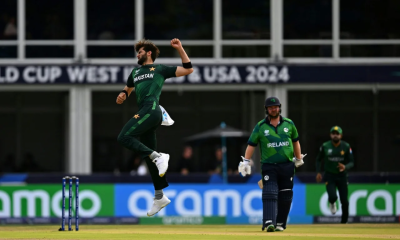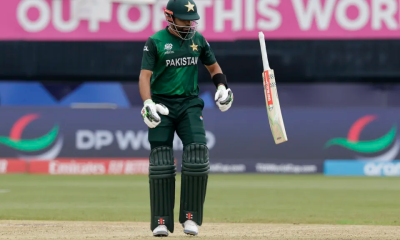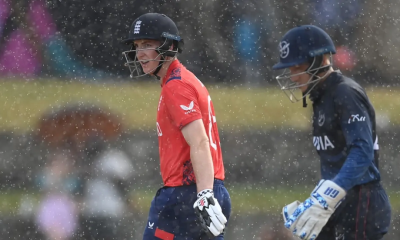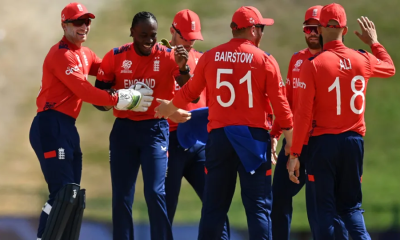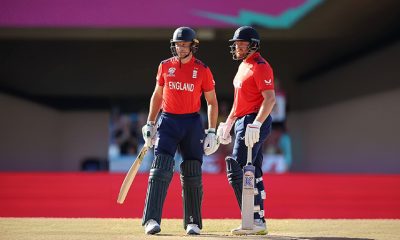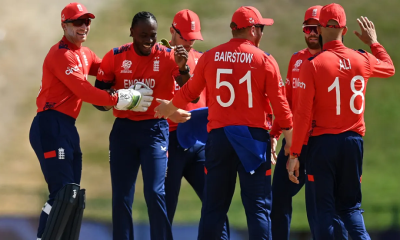Latest News
Jofra Archer impresses on comeback as Jos Buttler makes the difference in 23-run win
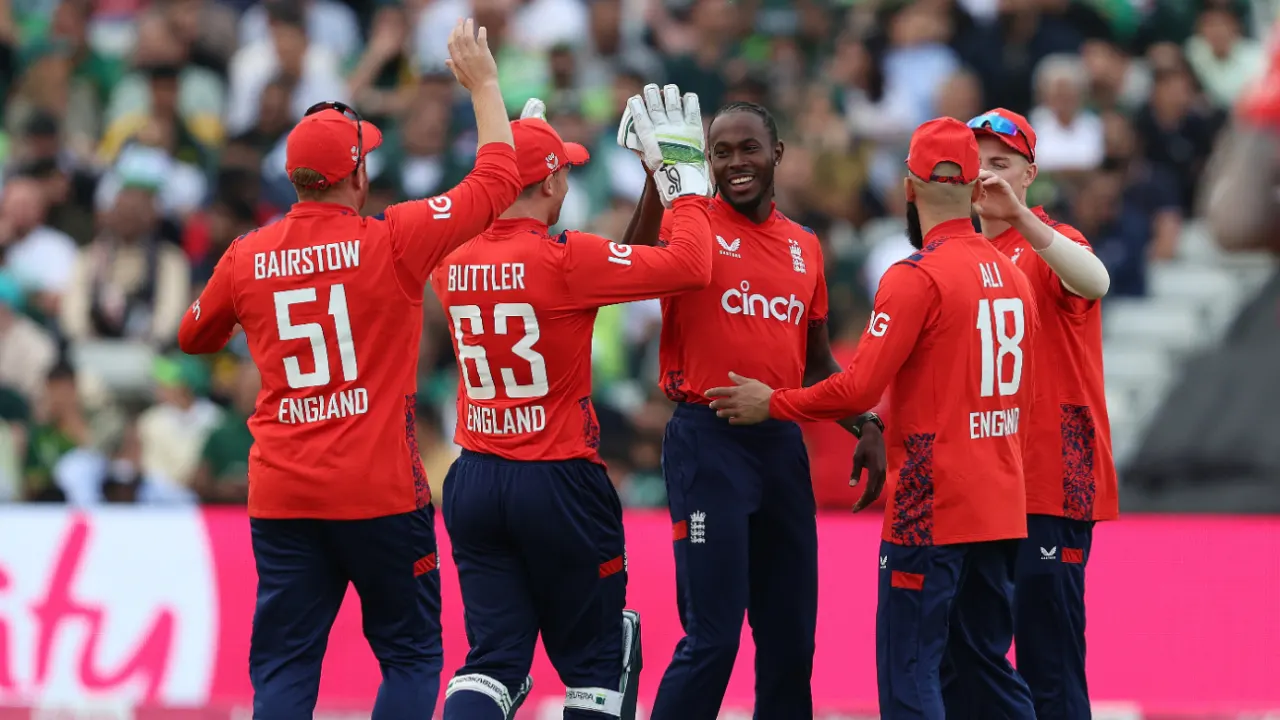
Joffra Archer took 2 for 28 and was clocked at 92mph/148kph in his first professional match in 385 days, as he overcame an expensive start to close out England’s victory over Pakistan at Edgbaston.
Playing in front of an international crowd in England for the first time since the 2019 Ashes, Archer slashed his first ball for four and crunched his third for six in a four-ball cameo of 12 not out. But his first over cost 15 runs, as Fakhar Zaman swung him over midwicket for four and scooped him for six after Babar Azam had rifled Archer’s second ball over mid-off.
But he struck with the first ball of his next over when Azam Khan chipped to short cover – prompting a broad smile after months of rehabilitation – and effectively sealed the win when he had Imad Wasim caught at deep point in his final over. He conceded a solitary boundary in his final three overs and was regularly clocked at 90mph/145kph or above.
Jos Buttler who described Archer’s performance as “brilliant”, was named player of the match for his own innings of 84 off 51 balls. Buttler looked scratchy early on but ruthlessly targeted Shadab Khan who bowled four wicketless overs for 55, only a fortnight after conceding his previous worst figures of 0 for 54 against Ireland. Buttler brought up 3,000 T20I runs in the process, the first Englishman to reach the landmark.
Pakistan kept the required rate manageable for much of their pursuit of 184, thanks primarily to Fakhar’s powerful innings of 45 off 21 from No. 4. But they lost wickets too regularly, with no partnership lasting for even 30 balls, and were eventually bowled out with four balls unused.
Buttler, playing a record-equalling 115th T20I for England, inside-edged his fourth ball past his leg stump and though he and Phil Salt traded boundaries in the first three overs, they both struggled for timing. Salt fell early, hauling Imad Wasim’s first ball to Shaheen Afridi at wide long-on, but Will Jacks looked in pristine touch at No. 3.
He lofted the fifth ball he faced for a straight six off Haris Rauf – playing his first match since February, when he dislocated his shoulder at the PSL – and had 21 off 10 balls at the end of the Powerplay, crashing boundaries through the covers off both Haris and Mohammad Amir. At the same stage, Buttler had a more sedate 19 off 17.
But Shadab’s introduction prompted a change in Buttler’s approach: he slapped the first ball of the legspinner’s over for four, and the final ball disappeared over long-on. Buttler went through his repertoire, deftly scooping Haris for six in between reverse-sweeping and reverse-slog-sweeping Shadab for four and then six. All told, he took 40 off the 15 balls he faced from him.
After Jacks slapped Rauf to point, Jonny Bairstow ground out four runs off his first 10 balls before slog-sweeping Shadab for six in his final over, which cost 20. He crunched Shaheen over extra cover for four then flicked his full toss away for six, but his top-edged pull to deep square leg set about a collapse of 5 for 25 in 25 balls.
Imad – whose four miserly overs cost only 19 runs – bowled Harry Brook as he backed away second-ball, while Buttler mistimed Haris’ slower ball to long-on as he looked to launch at the death. His 84 was his highest score in any international cricket since his hundred against South Africa in February 2023.
Shaheen struck twice in his final over, having Moeen Ali caught at wide long-on and Chris Jordan top-edging to short fine leg. Having looked set for 200, England at least went past 180 thanks to Archer’s cameo but when Liam Livingstone could only toe-end the final ball of the innings back to Amir, Pakistan looked in the game.
After 14 months since his last match for England, Archer had to wait another five overs until he was brought into the attack: Buttler threw the new ball to Moeen instead, and Mohammad Rizwan fell into the trap. After defending the first two balls of the innings, Rizwan charged down looking to haul Moeen over the leg side but could only pick out Livingstone at short midwicket.
Reece Taylor hared the new ball with Archer held back, and struck in his second over when Saim Ayub swung his rising length ball straight to deep square leg. Fakhar was nearly dismissed by the first ball he faced, edging just past Moeen at wide slip, but then deftly scooped his second for four and swung his fourth through midwicket.
Archer’s first ball was right on the money at 86mph/138kph, but his first over – the sixth – cost 15 as Fakhar raced to 27 off his first nine balls. But Babar fell without making much of a dent in the target, trapped lbw on the sweep by Moeen for 32 off 26 balls: the sort of innings that ignites debate over his role in Pakistan’s T20I side.
Fakhar continued to attack, swinging Moeen into the third tier of the pavilion, but struggled to get on strike. Adil Rashid – playing his first match since the ILT20 in February – conceded seven runs in his first two overs and accounted for Shadab, whose difficult afternoon culminated in a miscued slog-sweep to long-on.
Azam Khan crashed Jordan for back-to-back boundaries through point but when he miscued Archer to short cover, England were back on top. Archer’s second over cost only a single, and after Fakhar fell for 45 – swinging Livingstone down to long-on – the required rate climbed towards 12.
Imad and Iftikhar both briefly threatened, both launching towering sixes, but after the latter holed out off Topley, England’s seamers closed things out. Jordan, Archer and Topley conceded a solitary boundary between them in the final 20 balls of the innings, with Shaheen caught at deep midwicket to leave Pakistan bowled out 24 short of their target.
Brief score:
England 183/7 in 20 overs (Jos Buttler 84, Will Jacks 37, Jonny Bairstow 21; Shaheen Shah Afridi 3-36, Imad Wasim 2-19, Harris Rauf 2-34) beat Pakistan 160 in 19.2 overs (Babar Azam 32, Fakhar Zaman 45, Ifthikar Ahmed 23, Imad Wasim 22; Moeen Ali 2-26, Reece Topley 3-41, Joffra Archer 2-28, Chris Jordan 1-31, Adil Rashid 1-25, Liam Livingstone 1-09) by 23 runs
(Cricinfo)
Latest News
Muzarabani, Bennett orchestrate famous Zimbabwe win
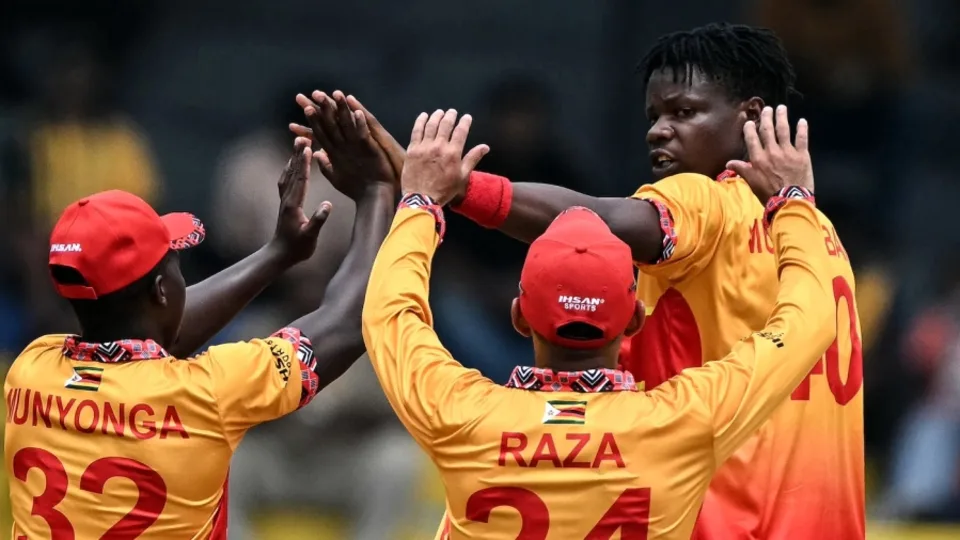
Zimbabwe remain undefeated against Australia in T20 World Cups after a career-best bowling display from Blessing Muzabarani and a gutsy 64 not out from Brian Bennett helped orchestrate a stunning 23-run win in Colombo and throw group B into chaos.
Muzarabani took 4 for 17 from four overs, ripping out the top order alongside Brad Evans in the powerplay who also took 3 for 23, as Australia never really looked close to chasing Zimbabwe’s impressive 169 for 2 on a slow pitch that had been set up by even contributions from the top four.
Matt Renshaw’s 65 off 44 gave Australia hope but on top of the polished display with bat and ball they also fielded superbly to restrict Australia and threaten their Super Eight hopes.
Brief scores:
Zimbabwe 169 for 2 in 20 overs (Brian Bennett 64*, Tadiwanashe Marumani 35, Ryan Burl 35, Sikandar Raza 25*; Marcus Stoinis 1-17, Cameron Green 1-06) beat Australia 146 in 19.3 overs (Travis Head 17, Glenn Maxwell 31, Matt Renshaw 65; Blessing Muzarabani 4-17, Brad Evans 3-23, Wellington Masakadza 1-36, Ryan Burl 1-09) by 23 runs
[Cricinfo]
Latest News
“We will not make decisions for rural level schools while sitting in Colombo” – PM

The Minister of Education, Higher Education and Vocational Education Prime Minister Dr. Harini Amarasuriya stated that aligning with the development activities carried out under the new education reforms, decisions at the rural level will not be taken from Colombo and plans should be sent based on the requirements of the rural level through the District Coordination Committees by structural committees. She further noted that all officials, from the Ministry of Education down to the school level, must commit to working efficiently and with a human-centered approach.
The Prime Minister made these remarks while addressing a discussion held with education authorities of the Hambantota District on Thursday [February 12] at the auditorium of the Hambantota District Secretariat regarding the new education reforms and prevailing issues in the education sector.
During the meeting, the Prime Minister provided an opportunity for education authorities including chief prelates of pirivenas, zonal education directors, teacher advisors, and principals to present the challenges they face and officials raised concerns including salary disparities among principals, developing school infrastructure, issues arising from the division between national and provincial schools, and uplifting pirivena education.
Further elaborating, Prime Minister stated:
“The new education reforms were initiated from 2025 through dialogue, consultations, and the collection of necessary data. As officials, you have extended your support to us during this process. We have embarked on a difficult and long journey, and we look forward to your continued cooperation.
We initiated these reforms in response to a strong social demand. Many have attempted such reforms at different times. Within our political vision, we understood clearly that if this country is to be rebuilt, an educational transformation is essential. The human resource is the most valuable resource of this country and it should be nurtured properly.
Solutions to many of the crises our country faces lie within the education system. Addressing the issues in economic challenges, social issues, drug abuse, violence, the breakdown of political culture, corruption, waste, and even the deterioration of human relationships all lie within the education.
In order to achieve the transformation we envision as a government, that an education transformation is necessary.
This education system should focus on reducing the pressures within the system, minimize school dropouts, increase employability, and instill confidence in children about their future.
There are disparities within the school system, between rural and urban schools, national and provincial schools, and difficult schools. This should not happen. All children must have equal opportunities.
Decisions regarding the establishment of schools or expansion of classes should not be political decisions. They must be decisions taken through Structural Committees. Those representatives understand their divisions, village economies, and population dynamics. Based on your decisions and assessments of needs, prepare the plans, discuss them with the District Coordination Committees, and submit them to us. We will then take steps to provide the necessary allocations and other support. We will not make decisions for the rural level while sitting in Colombo.
We are taking steps to minimize salary disparities. A Cabinet paper regarding the salary anomalies of principals has already been prepared for submission. Steps are also being taken to introduce new reforms in pirivena education through the Pirivena Committee of the Ministry of Education. We require the support of the chief prelates in this regard.
A significant number of teachers turn to human rights due to delays caused by inefficiency. Therefore, all officials from the Ministry of Education down to the schools must commit to working efficiently and in a humane manner”
The discussion was attended by Chief prelates of pirivenas, deputy ministers, Members of Parliament, zonal directors, principals, and other education sector officials.


[Prime Minister’s Media Division]
Latest News
USA need to overturn history to beat Netherlands and stay alive
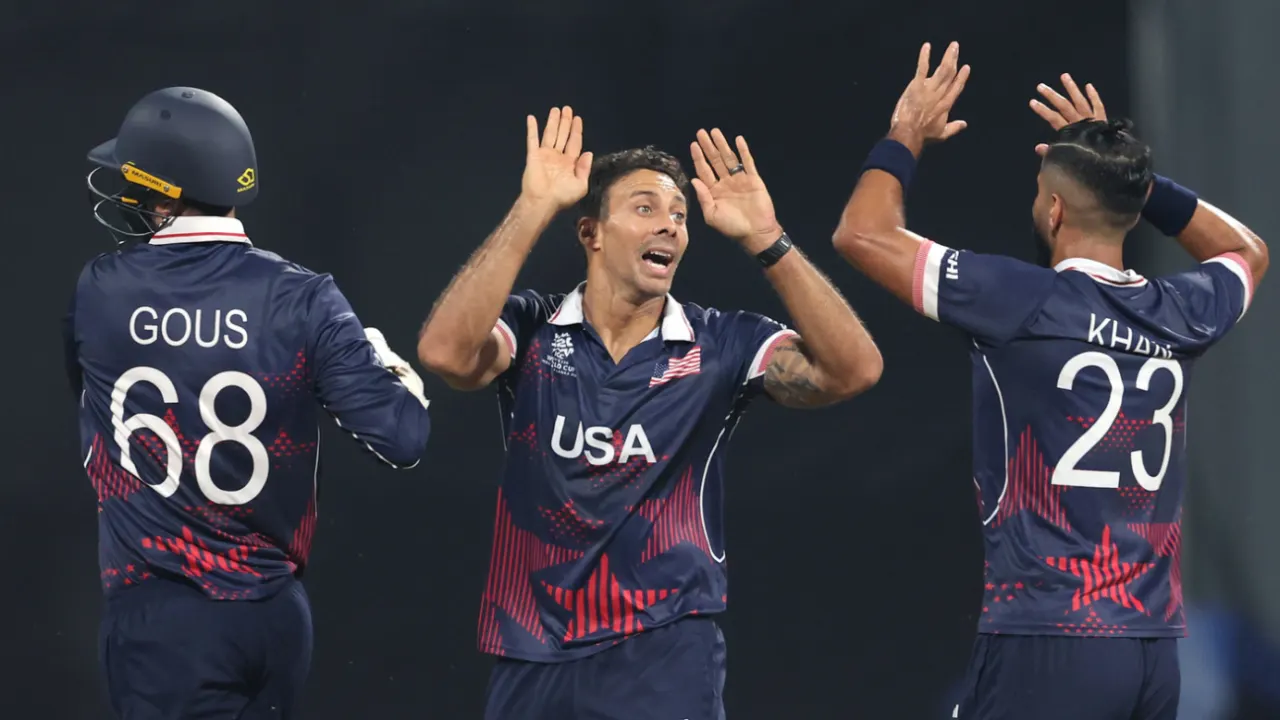
After running India close in their opening game in Mumbai, USA were outplayed by Pakistan in Colombo in their second. A third successive defeat, against Netherlands on Friday, will knock them out of contention for the Super Eight stage. History is also against USA: they have not beaten Netherlands in three attempts in men’s T20Is.
USA had earlier given New Zealand a scare during the warm-up fixture in Navi Mumbai, but injuries have weakened them since. Fast bowler Ali Khan is nursing a groin injury while Jasdeep Singh (shoulder injury) has been ruled out of the rest of the 2026 T20 World Cup, with former Pakistan fast bowler Ehsan Adil replacing him in the side. Adil was thrown into the XI straightaway in the second game, but ended up conceding 39 runs in three overs against the country of his birth at the Premadasa. It remains to be seen if Shubham Ranjane, who had hurt his knee, is back to full fitness.
USA are yet to nail down their opening combination: Saiteja Mukkamalla was left out after just one failure, against India. He was their most prolific batter in the lead-up to this World Cup and hit 50 off 31 balls in the warm-up match against New Zealand.
Netherlands will be high on confidence after easing past Namibia on the back of Bas de Leede’s all-round effort in Delhi. They bat deep, with Roelof van der Merwe listed at No. 9, and also have a surfeit of bowling options. That depth was central to giving Pakistan a scare in the tournament opener. Netherlands are also familiar with Chennai conditions – their entire squad trained at the Chennai Super Kings Academy in the city for around a week last month.
Picked as the only frontline left-arm spinner in the Netherlands side, ahead of Daniel Doram and Tim Pringle, Roleof van der Merwe followed up his 1 for 13 in three overs against Pakistan with 0 for 22 in two overs against Namibia. The 41-year-old could play a big role against a right-hand-batter heavy USA line-up.
Saurabh Netravalkar’s Mumbai homecoming was far from sweet: he ended up leaking 65 runs in his four overs for no wickets – the most by a bowler in an innings in the T20 World Cup. The left-arm seamer fared much better in USA’s next game against Pakistan, and will look to return to his best against Netherlands.
There’s no reason for Netherlands to tweak their winning combination unless there are any injuries or illnesses in their camp, though veteran Max O’Dowd has been below par.
Netherlands (probable): Max O’Dowd, Michael Levitt, Bas de Leede, Colin Ackermann, Scott Edwards (capt, wk), Zach Lion-Cachet, Logan van Beek, Aryan Dutt, Roelof van der Merwe, Timm van der Gugten, Fred Klaasen
If Ali Khan is fit, he could potentially come back in place of Adil. There might be a toss-up between Mukkamalla and Shayan Jahangir for the opening slot.
USA (probable): Andries Gous (wk), Shayan Jahangir/Saiteja Mukkamalla, Monank Patel (capt), Milind Kumar, Sanjay Krishnamurthi , Shubham Ranjane, Harmeet Singh , Mohammad Mohsin, Shadley van Schalkwyk, Saurabh Netravalkar, Ali Khan/Ehsan Adil
-

 Features6 days ago
Features6 days agoMy experience in turning around the Merchant Bank of Sri Lanka (MBSL) – Episode 3
-

 Business7 days ago
Business7 days agoZone24x7 enters 2026 with strong momentum, reinforcing its role as an enterprise AI and automation partner
-

 Business6 days ago
Business6 days agoRemotely conducted Business Forum in Paris attracts reputed French companies
-

 Business6 days ago
Business6 days agoFour runs, a thousand dreams: How a small-town school bowled its way into the record books
-

 Business6 days ago
Business6 days agoComBank and Hayleys Mobility redefine sustainable mobility with flexible leasing solutions
-

 Business2 days ago
Business2 days agoAutodoc 360 relocates to reinforce commitment to premium auto care
-

 Midweek Review2 days ago
Midweek Review2 days agoA question of national pride
-

 Business7 days ago
Business7 days agoHNB recognized among Top 10 Best Employers of 2025 at the EFC National Best Employer Awards


